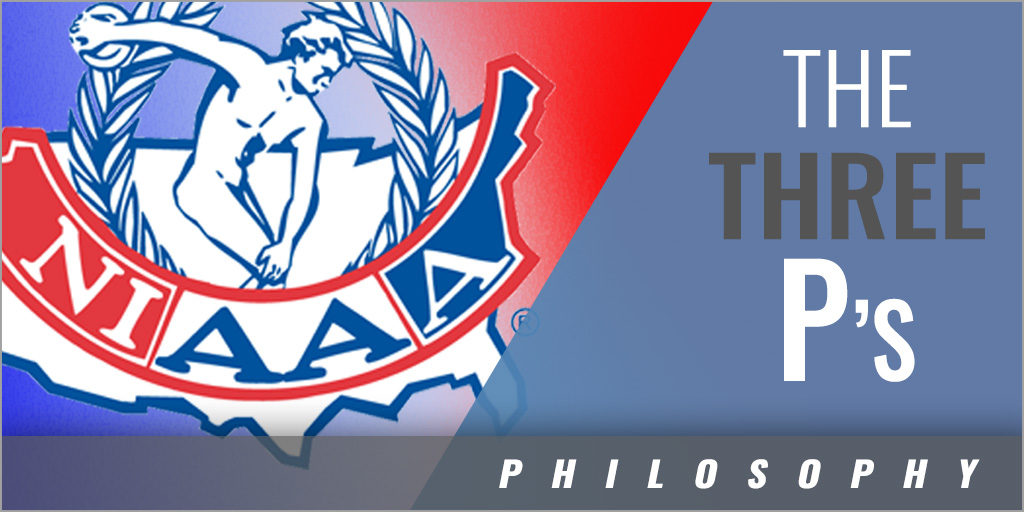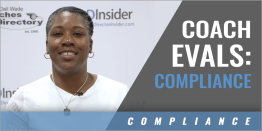By: Carter Wilson, CMAA - Georgia
PROBLEMS
Today, challenges and problems in athletics seemingly occur in almost every program and almost on a daily basis. These challenges and problems can involve any number of individuals and groups including, but not limited to, coaches, central office staff, athletes, parents, boosters, fans, and members of the community. The successful handling of such difficulties demands not only a significant amount of time and effort, but requires patience and timely decision making.
One of the reasons that there appears to be such a large number of problems in athletics is because of its high visibility. Athletics is the most visible aspect of education and evokes strong feelings in many communities and schools. The posting of high school football scores in the newspaper is still the one thread that continues to connect some people to a school many years after graduation.
Athletic Directors are asked to solve many problems in their jobs on a daily basis. The following suggestions are ways to help manage situations that may arise.
-
Do Something – It sounds rather simplistic, but the lack of action delivers the message that no one cares. Once a problem is brought to your attention, you assume ownership of the problem. It is up to you to solve the problem or to notify a higher authority that the problem exists.
-
Be Calm – Someone who is calm is seen as being in control, centered, and more respectable. Would you be more apt to believe someone who is predominately calm or someone who is always on edge? Your demeanor in a crisis is one of the strongest weapons in your arsenal. Don't lose it.
-
Understand the Mission of your School District – Don't allow your approach to problem solving to become so narrow that you miss the big picture. By taking a more global approach and understanding your district policy, you are more likely to have your decisions upheld by non-athletic people rather than having them over-turned and making you look bad.
-
Understand the Policies of the Athletic Department – Don't get tripped up by not following the policies in your own handbook. Make sure that in solving a problem, that you don't create a new one. You should know all consequences of your decisions.
-
Notify your Boss – In education, there is the tendency to solve problems at the lowest possible level. Often, people outside of education go to the highest possible level to solve their problems. Don't allow your supervisor to get blind-sided with a phone call, letter, or newspaper article about something happening in your department. Even if you are going to solve the problem, a courtesy call won't hurt.
-
Develop a plan – How do you want the situation to end? Before you make a decision, think through the beginning, the middle and the end to see if you are getting the desired outcome.
-
Stay on message – With the use of camera phones, cell phones, and other electronic devices, it is extremely important that you say the same thing yesterday, today, and tomorrow.
DIFFICULT PEOPLE
Difficult people are everywhere. You cannot avoid them. They can be students, coaches, parents, or members of the community. They do not go away with graduation and they do not necessarily go away with coaching changes. There always seem to be someone else to take his or her place. Developing a strategy is a much better way of dealing with difficult people.
Often the difficult people that we meet with are parents. These meeting are some of the most difficult meetings that we have because parents have a hard time being objective about their own children. Some tips on setting the stage for these meetings are:
-
Agree to meet in private – Don't encourage a spectacle by meeting in front of others. You determine the time and place. Don't be coaxed into having a difficult conversation following a game or other school event.
-
Gather positive information – Find something positive to say to open or close the conversation. Often you will be able to disarm people with kind words.
-
Anticipate questions – Do your research to find out what the person wants. What will they ask me? What are their demands?
-
Practice your responses – This will help you to relax. Often, the goal of the difficult person is to make you uncomfortable.
-
Begin with a polite, but firm manner – I will be professional, but I won't be a pushover.
-
Be prepared to admit mistakes and apologize – This will show the difficult person that you are flexible and looking to find common ground.
-
Expect that difficult situations will take time – Don't allow yourself to get rushed into an unsound decision. Allow ample time to work through the process.
-
Don't take things personally – Most of the time, the meeting about a system or a specific procedure, it is not about you.
Once the meeting starts, it is important that you work hard to stay in control of the meeting. Focus on the following techniques to maintain control of the meeting:
-
Use active listening skills
- Clarification – ask questions to clarify if you are not sure
- Paraphrasing – rephrase content
- Reflection – rephrase feelings
- Summarization – listen for themes or main points
- Physical cues – use head nods, eye contact, open body posture
-
Identify the Problem
- Clarify the expectations of the meeting- what are you trying to accomplish?
- Encourage the person to talk – This provides you more understanding of the “real issues”.
- Reframe the problem so that it is not personal.
- Make the problem something that you are both working on collaboratively to solve.
-
Know your limits
- You are not able or responsible to solve all problems
- Once you have done what you reasonably can do, don't beat yourself up of the outcome is not totally satisfactory to the other person.
- Don't let the other person’s problem become your problem.
- Know that you have done all that you can do and the problem is not you, it's them.
An Athletic Director should be aware of the options that are available in helping to facilitate meetings with difficult people. These options include, but are not limited to:
-
Ignore bad behavior – don’t stoop to a level that is less than professional
-
Give in on some lesser points – don’t win the battle and lose the war. By giving in on some lesser points, it shows that you are flexible and looking to find solutions to the problems.
-
Separate yourself from insulting behavior – often it is not you but your position that is being challenged. If someone else were in your position, they would be getting the same thing.
-
Try to understand the other point of view – when a position is different from yours, try understanding what causes the person to arrive at this point of view.
-
Make personal changes – maybe there are some changes that can be made in your interactions with others.
-
Make system changes – maybe we can alter a long-standing policy if it will allow us to better serve our students.
-
Stay detached emotionally – don’t get so involved that you make poor a poor decision.
-
Maintain Personal Dignity – always remain professional.
POLITICS
Having grown up in a family where one of my parents served as the mayor of our town, it has always been clear to me that almost everything is political. High School athletics is no exception. Whether it is the selection of the boy’s middle school basketball team, the creation of by-laws by the schools in your region, or the selection of projects to be funded by the athletic booster club. At some point in time every coach and athletic director must accept the fact that politics will be a part of high school athletics at some point.
On most occasions, the politics involved in athletics are subtle and could include things like:
-
A hidden agenda
-
The "good old boy" network
-
Maintaining the status quo
-
The nomination of awards
Currently, there appears to be more politics in high school athletics than ever before. As the amount of participation has increased in high school athletics so has the amount of politics facing athletic directors. Some of the reasons for the increase in athletics may be broken down into the following groups:
-
Rights of Taxpayers – There are more college-trained parents now than at any time in our history. Parents are involved in their kids’ lives, their education and their athletic careers. They feel like they have a right to discuss academic information and a right to discuss athletic information.
-
Activist/ Watchdog groups – This group of parents is politically active and will release information to the media to make it uncomfortable for coaches and athletic administrators.
-
Conspiracy Theorists- This group believes that the school system is hiding something and will protect employees at all cost. They believe that the school is inherently dishonest.
-
History of involvement in Youth Sports – Parents who had a big voice in little league sports and believe that they should have that same voice in the high school program.
-
Mistaken Belief – Parents who believe that because they are taxpayers, they have a right to know everything about the program.
-
History of Involvement in other School Organizations – Parents who believe that all school sponsored organizations should operate the same. Their participation in one group should guarantee participation the other group.
Some suggestions that may help one to deal with politics in high school athletics include:
-
Understanding that politics is involved in high school athletics and the greater the understanding of this fact, the greater that chance that you will be to survive in your job. Burying your head in the sand will not make politics go away.
-
Understanding the politics of athletics does not mean that you have to lose your integrity.
-
Be guarded about sharing your thoughts and opinions with others. There is a time for sharing your thoughts and ideas with others. Make sure that it is the right time and place.
-
Pick and choose your battles. Every issue is not worth going to war over. Know when to back off of certain issues.
-
Learn how to collaborate with others. In government, in education, and in athletics, it is important to form alliances to get things done.
-
Understanding all sides of an issue. Almost everyone has opinions about everything in the athletic department and will share them with you. Find out as much information as you can as to why people feel a certain way about an issue.
-
Learning to build bridges instead of burning bridges. Some times decisions will not go your way. Gather as many details as you can about why a decision went a certain way and form alliances that will help you to be successful the next time.
Politics in athletics can be either good or bad, but having an understanding of politics will allow you to survive and thrive as an athletic director.
Problems in the workplace, meeting with difficult people and politics in athletics have been around since the start of high school athletics. Being successful as an athletic administrator will require interactions with people in a multitude of situations. Your ability to effectively negotiate problems will go a long way towards thriving in this profession.
References:
Dobbs, Cory Dr., “Managing Conflict”, Business, Leadership, Psychology. October 31, 2011
Haefner, Jeff, “A Basketball Coaching Guide – How to Deal with Parents the Right Way and Avoid Unpleasant Problems.
Hagman, Warren and Killgore, Doug, “Dealing with Difficult People in Sports”.
Hoch, David Dr., “Dealing with “Politics” in High School Athletics”, Coach and Athletic Director. November 2000.
Kansas University: Counseling and Psychological Services, “Dealing with Difficult People & Difficult Situations”.
Smoll, Frank, “Athletic Search.com.”
WebMD.com, “Dealing with Difficult People: 17 tips to keep You Sane”.








